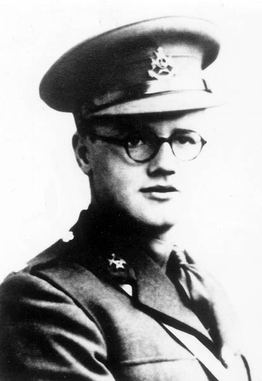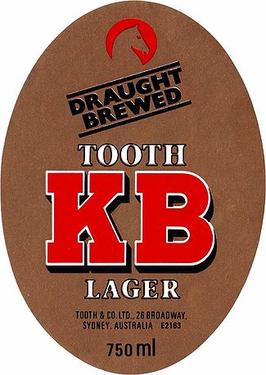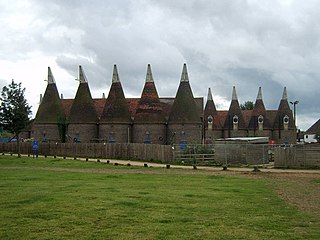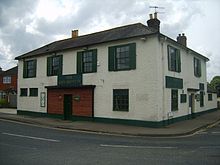
A pub is in several countries a drinking establishment licensed to serve alcoholic drinks for consumption on the premises. The term first appeared in England in the late 17th century, to differentiate private houses from those open to the public as alehouses, taverns and inns. Today, there is no strict definition, but the Campaign for Real Ale (CAMRA) states a pub has four characteristics:
- is open to the public without membership or residency
- serves draught beer or cider without requiring food be consumed
- has at least one indoor area not laid out for meals
- allows drinks to be bought at a bar

Paddock Wood is a town and civil parish in the borough of Tunbridge Wells in Kent, England, about 8 miles (13 km) southwest of Maidstone. At the 2001 Census it had a population of 8,263, falling marginally to 8,253 at the 2011 Census. Paddock Wood is a centre for hop growing.

Tonbridge and Malling is a local government district with borough status in Kent, England. The council is based at Kings Hill. The borough also includes the towns of Tonbridge and Snodland along with numerous villages including Aylesford, West Malling and surrounding rural areas.

The Borough of Tunbridge Wells is a local government district with borough status in Kent, England. It takes its name from its main town, Royal Tunbridge Wells. The borough also contains the towns of Paddock Wood and Southborough, along with numerous villages and surrounding rural areas. Large parts of the borough fall within the High Weald Area of Outstanding Natural Beauty.

Hadlow is a village and civil parish in the borough of Tonbridge and Malling in Kent, England. It is situated in the Medway valley, north-east of Tonbridge and south-west of Maidstone.

Greene King is a British pub and brewing company founded in 1799, currently based in Bury St Edmunds, Suffolk. The company also owns brands including Hungry Horse and Farmhouse Inns, as well as other pubs, restaurants and hotels. It was listed on the London Stock Exchange (LSE), until it was acquired by CK Assets in October 2019.

Captain John Henry Cound Brunt, was an English recipient of the Victoria Cross, the highest award for gallantry in the face of the enemy that can be awarded to British and Commonwealth forces.

Pub names are used to identify and differentiate traditional drinking establishments. Many pubs are centuries old, and were named at a time when most of their customers were illiterate, but could recognise pub signs. The use of signage was not confined to drinking establishments. British pubs may be named after and depict anything from everyday objects, to sovereigns, aristocrats and landowners. Other names come from historic events, livery companies, occupations, sports, and craftsmen's guilds. One of the most common pub names is the Red Lion. This list contains both modern and historical examples.

Fuller's Brewery in Chiswick, west London, England, is the former brewing division of Fuller, Smith & Turner PLC. It was a family-run business from its foundation in 1845 until 2019, when it was sold to the Japanese international beverage giant Asahi.
Whitbread is a British multinational hotel and restaurant company headquartered in Houghton Regis, England. The business was founded as a brewery in 1742 by Samuel Whitbread in partnership with Godfrey and Thomas Shewell, with premises in London at the junction of Old Street and Upper Whitecross Street, along with a brewery in Brick Lane, Spitalfields. Samuel Whitbread bought out his partners, expanding into porter production with the purchase of a brewery in Chiswell Street, and the company had become the largest brewery in the world by the 1780s.

Beer has been brewed in England for thousands of years. As a beer brewing country, it is known for top fermented cask beer which finishes maturing in the cellar of the pub rather than at the brewery and is served with only natural carbonation.

Harvester is a casual dining restaurant chain in the United Kingdom. The first, The George Inn, opened in 1983 in Morden, South London. The chain, set up by Courage Brewery to compete with Whitbread's Beefeater restaurants and Grand Metropolitan's Berni Inns, is currently run by Mitchells & Butlers.

Brewers Fayre is a licensed pub restaurant chain, with 161 locations across the UK as of August 2018. Owned by Whitbread, Brewers Fayre restaurants are known for serving traditional British pub food and for their Sunday Carvery.

Tooth and Co was the major brewer of beer in New South Wales, Australia. The company owned a large brewery on Broadway in Sydney from 1835 to 1985, known as the Kent Brewery. It was historically one of Australia's oldest companies, having been established as a partnership in 1835. The brand was revived in 2015.

McMullen's, known locally as Mac's, is a regional brewery founded in 1827 in Hertford, England. The brewery expanded during the second half of the 19th century by purchasing other breweries and their associated pubs.

The Hop Farm is a 400-acre (1.6 km2) Country Park in Beltring, near East Peckham in the English county of Kent. The farm is over 450 years old and has the largest collection of oast houses in the world.

The Hawkhurst branch line was a short railway line in Kent that connected Hawkhurst, Cranbrook, Goudhurst and Horsmonden with the town of Paddock Wood and the South Eastern and Medway Valley lines, a distance of 11 miles 24 chains.

Fremlin's was a brewery in Maidstone, Kent, England. It was established by Ralph Fremlin in 1861, who eschewed the pub trade and focused on bottled beer, on religious grounds. The beer was known for the distinctive elephant logo on the bottles. The brewery expanded to become the largest in Kent, before going into decline after being purchased by Whitbread in 1967.
Beer in Sussex is beer produced in the historic county of Sussex in England, East Sussex and West Sussex..

St Andrew's Church is a joint Anglican and Methodist church in Paddock Wood, Kent, England.




















